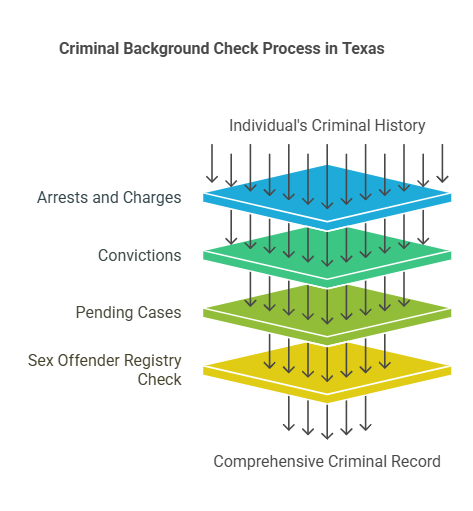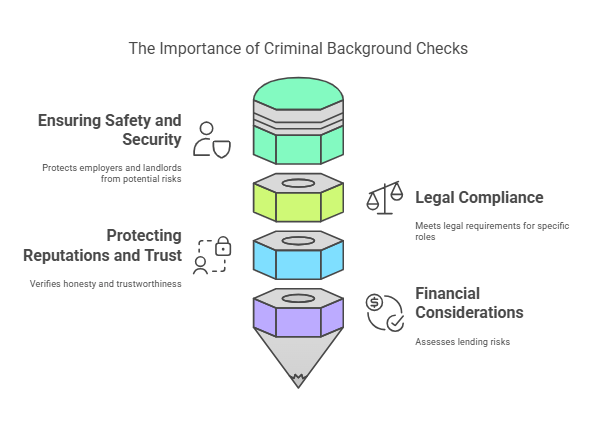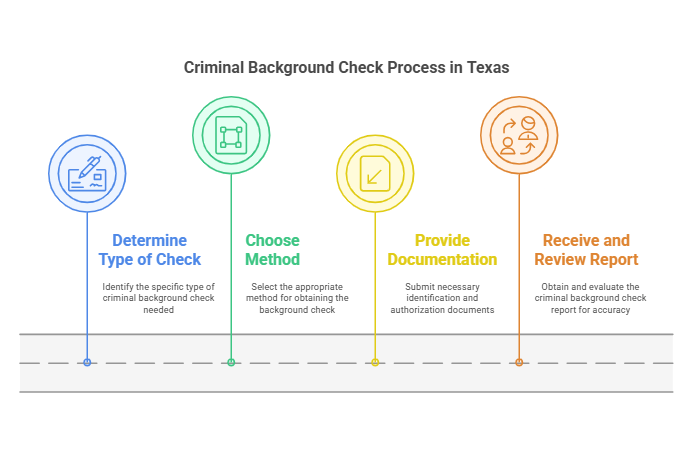Table of Contents
ToggleWhat is a Criminal Background Check in Texas and Why is it Important?

A criminal background check is an essential tool used to gather information about an individual’s criminal history. It plays a significant role in many processes, including hiring, renting, and even legal proceedings. In Texas, criminal background checks are vital for ensuring safety and compliance with state and federal laws. This part of the article will provide an in-depth explanation of what criminal background checks are in Texas, why they are conducted, and when they are necessary.
What is a Criminal Background Check in Texas?

A criminal background check in Texas involves the process of obtaining information about an individual’s past criminal activities, including arrests, convictions, and sentences. This check is typically conducted by employers, landlords, government agencies, and other organizations to assess the reliability and trustworthiness of an individual.
In Texas, criminal background checks are often carried out through databases maintained by state authorities, such as the Texas Department of Public Safety (DPS), or by checking county or federal court records. These records can include information on:
- Arrests and Charges: Details of arrests, the nature of the charges, and the outcome.
- Convictions: Information regarding any criminal convictions.
- Pending Cases: In some instances, records of cases that are still ongoing.
- Sex Offender Registry: Certain checks may include information about whether an individual is listed on the Texas sex offender registry.
A criminal background check in Texas is typically run against the Texas Crime Records database, which is a comprehensive compilation of criminal activity within the state. This database is updated regularly to include recent information from county jails, courts, and law enforcement agencies across Texas.
Why is a Criminal Background Check Important?

Criminal background checks serve as a critical tool for assessing the risk and suitability of an individual for various purposes. There are several key reasons why these checks are important in Texas:
- Ensuring Safety and Security
For employers, landlords, and other organizations, criminal background checks are essential for maintaining a safe environment. Employers may perform background checks on prospective employees to reduce the risk of workplace violence or theft. Landlords can use background checks to ensure that potential tenants do not have a history of violent crime or other behaviors that could put other tenants at risk. - Legal Compliance
Many Texas laws require criminal background checks, especially when dealing with certain sensitive positions. For example, individuals working in healthcare, law enforcement, or financial services may be legally required to undergo background checks. Similarly, landlords are required to perform criminal background checks as part of tenant screening in order to comply with state and local regulations. - Protecting Reputations and Trust
Whether it’s for employment or housing, a criminal background check helps maintain the integrity of both organizations and individuals. Employers use background checks to verify a candidate’s honesty and to ensure they are hiring trustworthy individuals. Similarly, landlords rely on criminal background checks to make sure they are renting to tenants who are likely to respect property and follow community rules. - Financial Considerations
Criminal background checks may be used by financial institutions and lenders to assess the risk of lending money to an individual. A criminal history, particularly involving fraud or financial crimes, could influence decisions regarding loan approvals or the terms of credit.
Common Situations Where Criminal Background Checks Are Required
There are several situations in which conducting a criminal background check is necessary or required in Texas. Some of the most common scenarios include:
- Employment Screening
Employers routinely perform criminal background checks as part of their hiring process. This is particularly common in industries where employees handle sensitive information or work in positions of trust, such as in healthcare, childcare, education, or financial services. - Tenant Screening
Landlords often conduct criminal background checks to assess whether a prospective tenant has a history of crimes such as theft, assault, or property damage. This helps landlords avoid renting to individuals who may pose a threat to the safety of other tenants or the property. - Adoption or Foster Care Applications
Individuals applying to adopt children or become foster parents in Texas are required to undergo a criminal background check. This ensures that the safety and well-being of children are prioritized. - Gun Purchase or Concealed Carry License
To legally purchase a firearm or apply for a concealed carry license in Texas, individuals must undergo a criminal background check. This process helps authorities ensure that only individuals without serious criminal records can legally own firearms. - Immigration and Visa Applications
Immigration authorities may request a criminal background check as part of the visa application process. This is especially common for those seeking to enter the U.S. for employment or residency purposes. - Legal Procedures
Criminal background checks are also required in certain legal procedures, such as when an individual is applying for a pardon or expungement of their criminal record. Courts may request background checks to determine the eligibility of a person for such procedures.
Criminal background checks in Texas serve a wide range of purposes, from ensuring the safety of workplaces and communities to complying with legal requirements. These checks provide important information about an individual’s criminal history, helping employers, landlords, and other entities make informed decisions. In the next section, we will dive deeper into the process of performing a criminal background check in Texas and outline the different methods available to obtain these records.
How to Perform a Criminal Background Check in Texas: A Step-by-Step Guide

Performing a criminal background check in Texas is a relatively straightforward process, but it can vary depending on the method used and the type of information needed. This part of the article provides a step-by-step guide on how individuals and organizations can access criminal records, the various methods available, and what to expect during the process.
Step 1: Determine the Type of Criminal Background Check You Need
Before starting the process, it’s important to understand the specific type of criminal background check required. In Texas, criminal background checks can be divided into several categories:
- State Criminal Background Check: This checks for criminal records within Texas, including arrests, convictions, and other legal information held by the Texas Department of Public Safety (DPS).
- National Criminal Background Check: This check looks at criminal records across the United States and is often used for federal employment, adoption applications, or when a broader check is necessary.
- County or Local Criminal Background Check: For more detailed or specific local criminal records, a check at the county level may be necessary. This type of check focuses on criminal records within a specific county.
Depending on your needs, you may choose one or more of these options.
Step 2: Choose Your Method of Obtaining a Criminal Background Check
There are several methods to obtain a criminal background check in Texas. Each has its advantages and may involve different costs, timeframes, and requirements. Below are the primary methods for checking criminal records in Texas:
- Texas Department of Public Safety (DPS) Online Services
The Texas DPS offers an online service to request a criminal background check for a fee. This service provides a statewide criminal history record information for individuals in Texas, and is one of the most commonly used methods.- How to Request:
- Visit the Texas DPS website.
- Use the Crime Records Service to initiate the request.
- You’ll need to provide identifying information, such as the individual’s full name, date of birth, and in some cases, fingerprints.
- You can pay the fee online via credit card, and the report will be delivered digitally.
- Cost:
The cost of a criminal background check from the Texas DPS is typically around $25 per request, but fees may vary depending on the specific service. - Timeframe:
Results are generally available within 3-5 business days, though this can vary depending on the volume of requests.
- How to Request:
- County Court Records
For specific or local criminal records, you may need to access county court records. This is particularly important if the individual lived or was arrested in a particular county.- How to Request:
- Visit the website of the county courthouse where the person’s criminal case was filed.
- Some counties provide online access to criminal records, while others may require in-person visits or mail requests.
- You may need to provide the full name, case number, or other identifying information.
- Cost:
Costs vary by county. Some counties charge a small fee for accessing court records, while others may provide them free of charge. - Timeframe:
The processing time can vary from a few hours to several days depending on the county’s resources and the volume of requests.
- How to Request:
- Third-Party Services
If you prefer a more streamlined process, third-party services can provide criminal background checks for individuals in Texas. These services often offer broader searches, including access to county, state, and even federal records.- How to Request:
- Choose a reputable third-party service provider that specializes in criminal background checks.
- Typically, you will need to provide personal details about the individual being checked.
- Payment is often required upfront for these services.
- Cost:
Third-party services often charge higher fees for comprehensive searches, typically ranging from $30 to $100 depending on the depth of the report. - Timeframe:
These services may provide results within a few minutes to several business days, depending on the search parameters.
- How to Request:
- FBI Criminal Background Check
For a national criminal background check, an FBI background check may be necessary. This type of check is generally required for federal employment, immigration purposes, or when applying for a concealed carry license.- How to Request:
- Visit the FBI’s official website or request through an authorized channel (such as a local law enforcement agency).
- This method requires fingerprint submission to the FBI for processing.
- Cost:
The fee for an FBI criminal background check is generally $18, but prices may vary depending on the method used. - Timeframe:
FBI checks can take several weeks to process, as they involve fingerprint analysis and nationwide data checks.
- How to Request:
Step 3: Provide Necessary Documentation
For all of these methods, you’ll need to provide necessary documentation to verify your identity and, in some cases, the identity of the person being checked. Common documents required include:
- Personal Identification: A government-issued ID (such as a driver’s license or passport).
- Fingerprinting: In some cases, especially for an FBI background check, fingerprints will be needed.
- Authorization: If you’re checking someone else’s record, their consent may be required, especially for private background checks.
Step 4: Receive and Review the Report
Once you’ve submitted your request and the background check has been processed, you will receive the report, which can include:
- Criminal History: Information about arrests, charges, convictions, and sentencing.
- Pending Charges: In some cases, the report will show ongoing cases.
- Expungements: Some records may have been expunged or sealed, meaning they won’t appear in the report.
It’s important to carefully review the report for accuracy and ensure that all information is correct. If any errors are found, you can typically dispute the findings with the relevant agency or court.
Comparison of Criminal Background Check Methods
| Method | Cost | Timeframe | Required Documentation |
|---|---|---|---|
| Texas DPS (State Check) | $25 | 3-5 Business Days | Name, DOB, Fingerprints (optional) |
| County Court Records | Varies by County | Hours to Days | Case Number, Name, County |
| Third-Party Services | $30-$100 | Minutes to Days | Name, DOB, and Address |
| FBI Check | $18 | Several Weeks | Fingerprints, Government ID |
Performing a criminal background check in Texas involves selecting the appropriate method based on your specific needs. Whether you’re checking state or county records, using third-party services, or requesting an FBI check, each method has its costs, requirements, and timeframes. Understanding the options available will help you make an informed decision on how to proceed. In the next section, we will address common questions about criminal background checks and explore legal considerations to ensure compliance with Texas law.
Frequently Asked Questions, Legal Considerations, and Conclusion on Criminal Background Checks in Texas
Criminal background checks in Texas are a key part of many processes, such as hiring, renting, and legal procedures. While obtaining a criminal background check is straightforward, there are several legal and procedural aspects to consider. This section will address some frequently asked questions and provide important legal considerations regarding criminal background checks in Texas. Additionally, best practices and actionable tips will be shared to help individuals and organizations navigate the process smoothly.
Frequently Asked Questions About Criminal Background Checks in Texas
How long do criminal records stay on file in Texas?
In Texas, criminal records do not have an expiration date. However, individuals may be eligible to have certain records sealed or expunged depending on the offense. For example, a record may be expunged if the individual was acquitted of the charge or if charges were dropped. Certain misdemeanor convictions may also be eligible for sealing after a specified period.
Tip: If you want to explore expungement or sealing options, consult with an attorney to understand your rights and eligibility.
What is the difference between a state and national criminal background check?
- State Criminal Background Check: This check includes criminal history data maintained by the Texas Department of Public Safety (DPS) and includes records from within the state. It provides a more localized view of an individual’s criminal background.
- National Criminal Background Check: This type of check covers criminal records from across the United States and is often requested by employers, landlords, or for federal requirements. The FBI provides this national check, which may involve fingerprinting.
Tip: A state criminal background check is sufficient for most local or state-level hiring and housing decisions. A national check is required for broader or federal searches.
Can a criminal record be used in hiring decisions?
Yes, criminal records can be used by employers to make informed hiring decisions. However, Texas law prohibits employers from discriminating against applicants solely based on criminal history, unless the conviction directly relates to the job duties. For instance, a company hiring for a financial position may not hire someone with a history of financial crimes.
Tip: Employers should have clear and consistent policies regarding criminal background checks and consider the relevance of an applicant's criminal record to the job in question.
How can I check if my criminal record is accurate?
If you believe that your criminal record contains inaccurate or outdated information, you can request a copy of your record through the Texas DPS or the FBI, depending on whether you need a state or national check. If errors are found, you can dispute them with the agency that provided the report.
Tip: Regularly check your criminal background to ensure that it’s accurate, especially before applying for jobs or housing.
What if there is a mistake on my background check?
If you find an error on your criminal background check, you can contact the agency that conducted the check to request a correction. In Texas, individuals can file a dispute with the Texas DPS or the relevant county court to fix any mistakes.
Tip: Be prepared with documentation that proves the error, such as court records or legal documents showing the dismissal or expungement of charges.
How long do criminal records stay on file in Texas?
In Texas, criminal records do not have an expiration date. However, individuals may be eligible to have certain records sealed or expunged depending on the offense. For example, a record may be expunged if the individual was acquitted of the charge or if charges were dropped. Certain misdemeanor convictions may also be eligible for sealing after a specified period.
Tip: If you want to explore expungement or sealing options, consult with an attorney to understand your rights and eligibility.
What is the difference between a state and national criminal background check?
- State Criminal Background Check: This check includes criminal history data maintained by the Texas Department of Public Safety (DPS) and includes records from within the state. It provides a more localized view of an individual’s criminal background.
- National Criminal Background Check: This type of check covers criminal records from across the United States and is often requested by employers, landlords, or for federal requirements. The FBI provides this national check, which may involve fingerprinting.
Tip: A state criminal background check is sufficient for most local or state-level hiring and housing decisions. A national check is required for broader or federal searches.
Can a criminal record be used in hiring decisions?
Yes, criminal records can be used by employers to make informed hiring decisions. However, Texas law prohibits employers from discriminating against applicants solely based on criminal history, unless the conviction directly relates to the job duties. For instance, a company hiring for a financial position may not hire someone with a history of financial crimes.
Tip: Employers should have clear and consistent policies regarding criminal background checks and consider the relevance of an applicant's criminal record to the job in question.
How can I check if my criminal record is accurate?
If you believe that your criminal record contains inaccurate or outdated information, you can request a copy of your record through the Texas DPS or the FBI, depending on whether you need a state or national check. If errors are found, you can dispute them with the agency that provided the report.
Tip: Regularly check your criminal background to ensure that it’s accurate, especially before applying for jobs or housing.
What if there is a mistake on my background check?
If you find an error on your criminal background check, you can contact the agency that conducted the check to request a correction. In Texas, individuals can file a dispute with the Texas DPS or the relevant county court to fix any mistakes.
Tip: Be prepared with documentation that proves the error, such as court records or legal documents showing the dismissal or expungement of charges.
Legal Considerations for Criminal Background Checks in Texas
- The Fair Credit Reporting Act (FCRA)The FCRA is a federal law that regulates how background checks are conducted. Employers, landlords, and other entities conducting background checks must comply with the FCRA. This includes obtaining the applicant’s consent before conducting a background check and informing them of any adverse actions (e.g., not hiring them based on the criminal background).Tip: Always obtain written consent from individuals before performing a criminal background check, and provide them with the necessary information if you decide to take action based on the results.
- Texas Law on Criminal Records in Employment In Texas, employers cannot automatically disqualify a candidate based on a criminal conviction. Employers are required to assess the nature of the offense and its relevance to the position being applied for. However, Texas does allow employers to consider criminal convictions in their hiring decisions. Tip: Texas employers should use criminal background checks as one of many factors in the hiring process. Focus on the candidate’s qualifications, skills, and the specific requirements of the job.
- Texas Ban the Box Law The “Ban the Box” law in Texas prohibits most public employers from asking about an applicant’s criminal history on initial job applications. Employers can still conduct background checks later in the hiring process, but they cannot disqualify candidates based solely on their criminal history before the interview stage. Tip: If you’re an employer, ensure you are complying with this law by not asking about criminal convictions in the initial stages of hiring, and focus on qualifications first.
- Confidentiality and Data Protection Criminal background checks are considered sensitive information, and both state and federal laws require that this information be handled with care. Employers and organizations conducting background checks must ensure that the information is stored securely and not shared inappropriately.Tip: Always store criminal background check results securely and share them only with authorized individuals within your organization.
- Access to Criminal RecordsWhile criminal background checks are commonly used for employment, housing, and legal purposes, individuals have the right to access their own criminal records. In Texas, anyone can request a copy of their criminal history report from the Texas DPS or other authorized agencies.Tip: If you’re an individual, consider checking your criminal record regularly to ensure accuracy, especially before applying for jobs, housing, or other opportunities where a background check may be required.
Best Practices for Conducting Criminal Background Checks in Texas
- Obtain Written Consent: Always get written consent from individuals before conducting a criminal background check. This ensures compliance with legal requirements and builds trust with candidates or tenants.
- Be Transparent: Inform candidates, employees, or tenants about the background check process. Let them know why the check is being conducted and how the results will be used.
- Use the Right Source: Ensure that you are using the correct method to obtain criminal records. For Texas-specific checks, the Texas DPS is the best resource, but county courts may be needed for more localized records.
- Evaluate Results Carefully: When reviewing a criminal background check, assess the relevance of the information to the specific role, housing situation, or legal requirement. Focus on the facts rather than making decisions based on assumptions or bias.
- Maintain Confidentiality: Always keep criminal background check information confidential and ensure it is securely stored. Share it only with those who need to know within your organization.
Conclusion
Criminal background checks in Texas are essential for various purposes, including employment, housing, and legal matters. By understanding how to perform these checks, the legal considerations involved, and the best practices for handling criminal records, individuals and organizations can ensure that they are acting ethically and in compliance with the law. Always remember to keep confidentiality, be transparent with individuals, and ensure accuracy in the background check process. Whether you’re hiring a new employee, renting a property, or simply checking your own record, following these steps and guidelines will help make the process smooth and effective.
